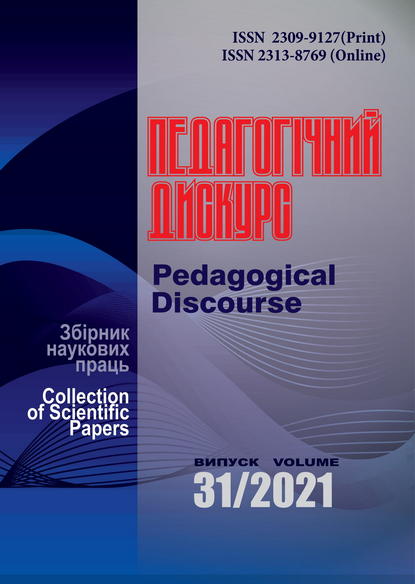Intercultural Competence of Pre-Service Preschool Educators for the Globalized Community’s Requirements
Abstract
The issue related to preservice preschool educators training in the USA and Ukraine has been explored. Research focused on defining the concept intercultural competence to distinguish its elements and their content. It also explored how intercultural competence evolved in the USA and came to be substituted by global competence focusing on the preparing globally competent workforce and cultural competence that is meant to be the core competence for educators dealing with the diverse population. The research studied how scholars defined the concept to describe the structure and content of cultural competence that could be useful for developing programs. It focuses on effective strategies that promote teaching cultural competence to preservice preschool educators.
The research findings proved the importance of cultural competence for preservice preschool educators training in Ukraine. In the Preschool Educator professional standard in Ukraine cultural competence is included in the list of general competencies. The cultural competence is presented as the ability to show respect and appreciate Ukrainian culture, value diversity and multiculturalism; to be self-aware of national identity, and be able to express oneself creatively. As the standard does not include neither intercultural competence nor global competence, which are designed to teach skills for successful interaction in a globalized society, it is suggested that the cultural competence structure should be reconsidered redefined. It is advisable to extrapolate the American experience, which accumulates best practices in training highly qualified educators capable of working in a multicultural environment.
Downloads
References
Avsheniuk, N. M. (2020). Hlobalna kompetentnist uchnia. Shcho tse i navishcho potribno [Global Teacher Competence. What Is It and Why Is It Needed]. Shkola – School, 3, 42 –53 [in Ukrainian].
Amos, Y. T. (2010). «They don’t want to get it!»: Interaction between minority and White pre-service teachers in a multicultural education class. Multicultural Education, 17 (4), 31–37. [in English].
Brustein, W. (2003). Personal communication. Pittsburgh, Pennsylvania. [in English].
Cross, T., Bazron, B., Dennis, K., & Isaacs, M. (1989). Towards A Culturally Competent System of Care, Volume I. Washington, DC: Georgetown University Child Development Center, CASSP Technical Assistance Center. [in English].
de Guzman M. R.T., Durden T. R., Taylor S. A., Guzman J. M., Potthoff, K. L. (2016). Cultural Competence An Important Skill Set for the 21st Century. Retrieved from https://extensionpublications.unl.edu/assets/html/g1375/build/g1375.htm [in English].
Deardorff, D. K. (2006), The Identification and Assessment of Intercultural Competence as a Student Outcome of Internationalization at Institutions of Higher Education in the United States, Journal of Studies in International Education, 10, 241–266 [in English].
Federal Bureau of Investigation (2014). Bias breakdown (note: News release from the Annual Hate Crime Statistics Report). Retrievd from https://www.fbi.gov/news/stories/2014/december/latest-hate-crime-statistics-report-released [in English].
Grosvenor, G. (1998). Americans Get Low Grades in Gallup Geography, Test. Washington, D.C.: National Geographic Society. [in English].
Kendall, J. (n.d.). Setting Standards in Early Childhood Education. Retrieved from: https://www.ascd.org/el/articles/setting-standards-in-early-childhood-education [in English].
Lambert, R. (1993). Remarks. Educational Exchange and Global Competence. Collected Works – Conference Proceedings New York, NY: Council on International Educational Exchange. Retrieved from: https://files.eric.ed.gov/fulltext/ED368275.pdf [in English].
Lim, C.I., & Able-Boone, H. (2005). Diversity competencies within early childhood teacher preparation: Innovative practices and future directions. Journal of Early Childhood Teacher Education, 26, 225–238 [in English].
National Association for the Education of Young Children. (1995). Responding to Linguistic and Cultural Diversity Recommendations for Effective Early Childhood Education. A position statement. Retrieved from: https://www.naeyc.org/sites/default/files/globally-shared/downloads/PDFs/resources/position-statements/PSDIV98.PDF [in English].
National Association for the Education of Young Children (NAEYC) and National Association of Early Childhood Specialists in State Departments of Education (NAECS/SDE). (1991). Guidelines for appropriate curriculum content and assessment in programs serving children ages 3 through 8. Young Children, 46 (3), 21–38. [in English].
National Center for Education Information (2011). Profile of teachers in the U.S. 2011. Retrieved rom http://www.edweek.org/media/pot2011final-blog.pdf [in English].
National Center for Education Statistics (2013). Racial/ethnic enrollment in public schools. Retrieved from http://nces.ed.gov/programs/coe/pdf/coe_cge.pdf. [in English].
National Center for Education Statistics (NCES). (1993). Language characteristics and schooling in the United States, a changing picture: 1979 and 1989. NCES 93-699. Washington, DC: U.S. Department of Education, Office of Educational Research and Improvement. [in English].
Picower, B. (2009). The unexamined Whiteness of teaching: How White teachers maintain and enact dominant racial ideologies. Race, Ethnicity and Education, 12 (2), 197–215. [in English].
Taylor, T., et al. (1998). Training and Technical Assistance Manual for Culturally Competent Services and Systems: Implications for Children with Special Health Care Needs. National Center for Cultural Competence, Georgetown University Child Development Center. [in English].
Terenzini, P. T., & Upcraft, M. L. (1996). Assessing programs and service outcomes. In: M. L. Upcraft & J. H. Schuh (Eds.), Assessment in student affairs: A guide for practitioners (pp. 217–239). San Francisco: Jossey-Bass [in English].
Тhe Center for Culturally Proficient Educational Practice. Retrieved from: https://ccpep.org/home/what-is-cultural-proficiency/the-framework/ [in English].
U.S. Census Bureau (2010). The Hispanic population: 2010. Retrieved from http://www.census.gov/prod/cen2010/briefs/c2010br-04.pdf [in English].
U.S. Census Bureau (2011). Overview of race and Hispanic Origin: 2010. Retrieved from: http://www.census.gov/library/publications/2011/demo/c2010br-02.html [in English].
Copyright (c) 2021 Pedagogical Discourse

This work is licensed under a Creative Commons Attribution-NonCommercial-ShareAlike 4.0 International License.

















